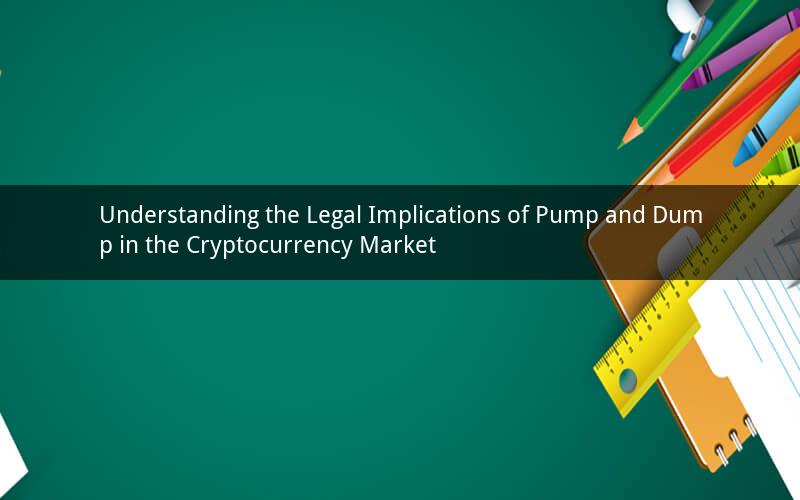
The cryptocurrency market has seen its fair share of volatility, with investors often seeking ways to maximize their profits. One of the most controversial strategies used is the "pump and dump." This article delves into the legality of this practice in the crypto world, exploring the potential consequences for those involved.
1. What is a pump and dump in the cryptocurrency market?
A pump and dump is a fraudulent scheme where a group of individuals collaboratively drives up the price of a cryptocurrency, often through false or misleading information. Once the price reaches a peak, the group sells their holdings, causing the price to plummet. This strategy is typically used on less established cryptocurrencies, where there is less regulatory oversight.
2. Is it illegal to pump and dump crypto?
The legality of pump and dump activities in the cryptocurrency market varies depending on the jurisdiction. In some countries, it is considered illegal due to its fraudulent nature, while in others, it may be legal but unethical.
In the United States, the Securities and Exchange Commission (SEC) has taken a strong stance against pump and dump schemes. The SEC views cryptocurrencies as securities when they meet certain criteria, and engaging in pump and dump activities can lead to charges of securities fraud. Penalties for such violations can include fines, restitution, and even imprisonment.
In the European Union, the situation is similar, with the European Securities and Markets Authority (ESMA) monitoring and investigating pump and dump activities. Other countries, such as China and South Korea, have also taken action against these fraudulent schemes.
3. What are the potential consequences of pump and dump activities?
The consequences of engaging in pump and dump activities can be severe. For individuals, the following penalties may apply:
- Civil lawsuits: victims of pump and dump schemes can file lawsuits against the perpetrators, seeking damages for their financial losses.
- Regulatory fines: regulatory bodies, such as the SEC, can impose substantial fines on individuals or entities involved in pump and dump activities.
- Criminal charges: in some cases, individuals may face criminal charges, including securities fraud, conspiracy, and money laundering.
- Reputation damage: the involvement in a pump and dump scheme can severely damage an individual's reputation within the cryptocurrency community.
4. How can investors protect themselves from pump and dump schemes?
To avoid falling victim to pump and dump schemes, investors should take the following precautions:
- Conduct thorough research: before investing in a cryptocurrency, do your homework and verify the legitimacy of the project.
- Be wary of unsolicited investment opportunities: if someone approaches you with an investment opportunity, especially if it involves a high return on investment, be cautious.
- Stay informed: keep up-to-date with the latest news and developments in the cryptocurrency market, as fraudulent schemes often exploit investors' lack of knowledge.
- Use reputable exchanges: trade cryptocurrencies on well-established and regulated exchanges to minimize the risk of falling victim to pump and dump schemes.
- Diversify your portfolio: avoid investing all your funds in a single cryptocurrency, as this can increase your exposure to pump and dump activities.
5. What role do regulatory bodies play in combating pump and dump schemes?
Regulatory bodies, such as the SEC, ESMA, and other national securities commissions, play a crucial role in combating pump and dump schemes. They do so by:
- Investigating and enforcing laws against fraudulent activities: regulatory bodies investigate and take action against individuals and entities involved in pump and dump schemes.
- Providing investor education: regulatory bodies offer resources and guidelines to help investors make informed decisions and avoid falling victim to fraudulent schemes.
- Collaborating with other agencies: regulatory bodies often work together with law enforcement agencies and other financial institutions to combat pump and dump activities.
In conclusion, the legality of pump and dump activities in the cryptocurrency market varies depending on the jurisdiction. While it is considered illegal in some countries, others may view it as unethical but not necessarily illegal. Regardless of the jurisdiction, the consequences of engaging in pump and dump schemes can be severe, including civil lawsuits, regulatory fines, and criminal charges. To protect themselves from these fraudulent schemes, investors should conduct thorough research, be wary of unsolicited investment opportunities, and stay informed about the latest market developments. Regulatory bodies also play a crucial role in combating pump and dump activities by investigating and enforcing laws, providing investor education, and collaborating with other agencies.